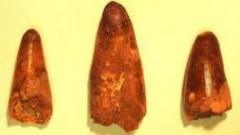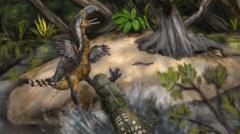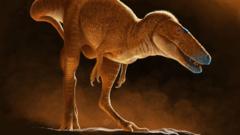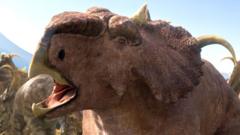French customs officials recently intercepted a transport containing dinosaur teeth, leading to inquiries regarding the legality of fossil exportation.
French Customs Discovers Rare Dinosaur Teeth in Routine Lorry Inspection

French Customs Discovers Rare Dinosaur Teeth in Routine Lorry Inspection
French authorities find nine prehistoric teeth, sparking discussions on fossil collection and export regulations.
In a routine inspection near the Italian border, French customs officers uncovered nine dinosaur teeth in a Spanish lorry on January 28. The unexpected find occurred while the agents were conducting random checks on the A8 motorway, an area known for smuggling attempts, including illegal drugs.
Upon inspection of two parcels, officials discovered the fossilized remains and promptly sent them for further analysis to a prehistory museum in Menton. Experts determined that the teeth originated from reptiles that lived during the Late Cretaceous period, approximately 72 to 66 million years ago, in Morocco.
Among the identified specimens, one tooth belonged to Zarafasaura oceanis, a marine reptile historically recognized in Morocco, while three teeth had belonged to the larger Mosasaurus, which could measure up to 12 meters in length. The remaining five teeth are believed to be from Dyrosaurus phosphaticus, a precursor to modern crocodiles.
The lorry driver informed customs that he was delivering these parcels to clients in the Italian cities of Genoa and Milan. French authorities are now focused on identifying the recipients of these fossils, as while fossil collection can be legal, exporting such items often requires a specific license to adhere to legal frameworks.
This incident raises important questions around the collection, trade, and preservation of palaeontological artifacts, particularly in a global context where fossil legality and ethical considerations are increasingly scrutinized.
Upon inspection of two parcels, officials discovered the fossilized remains and promptly sent them for further analysis to a prehistory museum in Menton. Experts determined that the teeth originated from reptiles that lived during the Late Cretaceous period, approximately 72 to 66 million years ago, in Morocco.
Among the identified specimens, one tooth belonged to Zarafasaura oceanis, a marine reptile historically recognized in Morocco, while three teeth had belonged to the larger Mosasaurus, which could measure up to 12 meters in length. The remaining five teeth are believed to be from Dyrosaurus phosphaticus, a precursor to modern crocodiles.
The lorry driver informed customs that he was delivering these parcels to clients in the Italian cities of Genoa and Milan. French authorities are now focused on identifying the recipients of these fossils, as while fossil collection can be legal, exporting such items often requires a specific license to adhere to legal frameworks.
This incident raises important questions around the collection, trade, and preservation of palaeontological artifacts, particularly in a global context where fossil legality and ethical considerations are increasingly scrutinized.





















